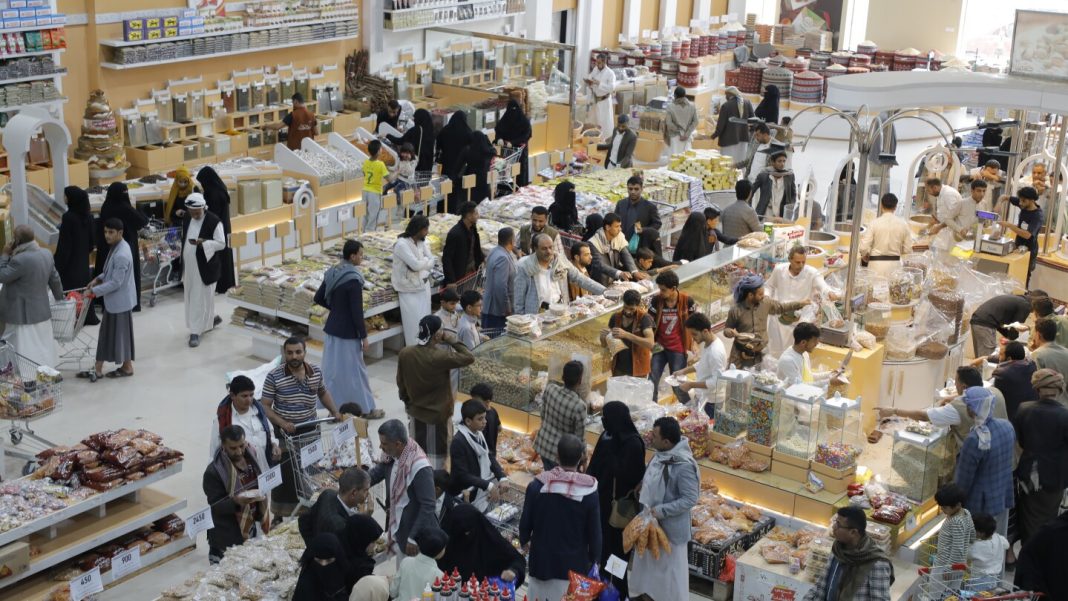SANAA, Yemen (news agencies) — Yemen’s Houthi rebels and its internationally recognized government are locked in a fight for control of the country’s banks that experts warn is threatening to further wreck an economy already crippled by nearly a decade of war.
The rivalry over the banks is throwing Yemen’s financial system into deeper turmoil. Already, the Houthis who control the north and center of the country and the government running the south use different currency notes with different exchange rates. They also run rival central banks.
The escalating money divide is eroding the value of Yemen’s currency, the riyal, which had driven up prices for clothing and meat before the Islamic holiday of Eid al-Adha started on Sunday.
For weeks, Yemenis in Houthi-controlled areas have been unable to pull their money out of bank savings accounts, reportedly because the Houthi-run central bank, based in the capital, Sanaa, has stopped providing liquidity to commercial and government banks. Protests have broken out in front of some banks, dispersed by security forces.
Yemen has been torn by civil war ever since the Iranian-backed Houthi rebels took over Sanaa and much of Yemen’s north and center in 2015. The Saudi-backed internationally recognized government and its nominal ally the Southern Transitional Council, a group supported by the United Arab Emirates, govern the south and much of the east, centered in the southern port city of Aden.
Yemen was already the Arab world’s poorest country before the war began. Punitive actions by each side against the other’s banks over the past week now threaten to undermine merchants’ ability to import food and basic commodities and to disrupt the transfer of remittances from Yemenis abroad, on which many families depend, said Edem Wosornu, director of operations and advocacy for the U.N. humanitarian coordination office known as OCHA.
“All these factors will likely deepen poverty, worsen food insecurity and malnutrition, and increase reliance on humanitarian assistance,” she told a U.N. Security Council briefing on Thursday. The dispute could escalate to the point that banks in Houthi-run areas are barred completely from international financial transactions, which she said would have “catastrophic ramifications.”
The internationally recognized government moved the central bank to Aden in 2016, and since then began issuing new banknotes to replace worn-out riyals. Houthi authorities, which set up their own central bank in Sanaa, banned the use of the new money in areas under their control.
In March, the Houthi-controlled central bank announced it was rolling out its own new 100-riyal coins. The international community and Yemen’s recognized government denounced the move, saying the Houthis were trying to set up their own financial system and warning it will deepen Yemen’s economic divide.
Adding to the confusion, the bills have different exchange rates — riyals issued in Sanaa go for about 530 to the dollar, while those from Aden are around 1,800 to the dollar.
In response, the Aden-based central bank gave banks 60 days to relocate their headquarters to the southern city and stop operating under Houthi policies, or else risk facing sanctions related to money laundering and anti-terrorism laws.
The central bank was “forced to make these decisions, especially after the Houthi group issued their own currency and took unilateral steps towards complete independence from the internationally recognized Central Bank in Aden,” said Mustafa Nasr, an economic expert and head of the Studies and Economic Media Center SEMC.
No banks met the deadline — either because they needed more time or because they feared Houthi sanctions if they moved, Nasr said.
When the deadline ran out last week, the central bank in Aden banned dealing with six banks headquartered in Sanaa, meaning currency exchange offices, money transfer agencies and banks in the south could no longer work with them.
In retaliation, the Houthi-run central bank in Sanaa banned all dealings with 13 banks headquartered in Aden. That means people in Houthi-controlled areas can’t deposit or withdraw funds through those banks or receive wire transfers made through them.
Even as the fight for control is going on, both sides are facing a cash crunch. The Houthi government has few sources of foreign currency and its new coins aren’t recognized outside its territory.




